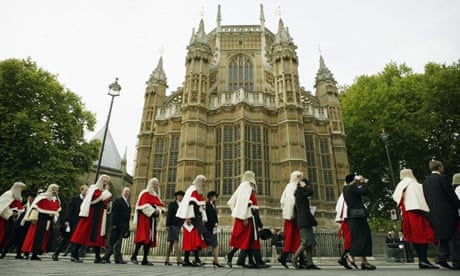An attempt by government-appointed experts to reform human rights legislation and introduce a bill of rights has failed to reach consensus, leading to a split report that highlights the constitutional fragility of the UK.
Two Conservative members of the Commission on a Bill of Rights advocate withdrawing from the European convention on human rights, several suggesting giving the legislation a more British complexion. Two oppose any change at all.
One of the few points of agreement reached by the nine-member panel was that nothing should be altered until after the outcome of the Scottish referendum on independence in 2014, when a constitutional convention should be held.
The devolution issue gained prominence after human rights groups and the devolved governments in Wales, Scotland and Northern Ireland told the commission they were determined to safeguard the existing Human Rights Act.
The commission has spent the past 20 months examining whether the Human Rights Act, introduced by Labour in 1998, should be superseded by a UK bill of rights. Seven of the members suggest there should be a new bill in principle, but cannot agree precisely what form it might take.
The chairman of the commission, Sir Leigh Lewis, a former permanent secretary at the Home Office and Department for Work and Pensions, sided with the majority. He said: "Our current human rights structures do not enjoy great public support and ownership and are seen very much as someone else's creation [from abroad ]."
Lewis denied that a bill would merely be a re-branding exercise and said: "We were struck by the fact that [within Europe] we are unique in neither having our own constitution nor our own bill of rights decided by our own parliament."
Lord Faulks QC, and Jonathan Fisher QC, the Tory members who believe the UK might be better off leaving the European convention on human rights and the court in Strasbourg, said: "There are strong arguments that the cause of human rights, both in the UK and internationally, would be better served by withdrawal from the convention … or at the very least a renegotiation of the UK's terms of membership so as to free it from the strictures of the court."
In a minority view, two of the commission members, Philippe Sands QC, a Liberal Democrat adviser, and the Labour peer Baroness Kennedy QC, oppose the introduction of a UK bill of rights for fear it would be used to lever the UK out of the European court of human rights.
They have said: "In the course of our deliberations it became evident that a number of [others on the commission] would like the United Kingdom to withdraw from the European convention … the unambiguous expression of such views offered openly in the course of our deliberations has made it clear to us that for some of our colleagues a UK bill of eights is a means towards withdrawal from the European convention.
"We believe that such a path would be catastrophic for the UK, for Europe and for the protection of human rights around the world."
The terms of reference of the commission, however, were carefully crafted by the Liberal Democrats and state that: "The commission will investigate the creation of a UK bill of rights that incorporates and builds on all our obligations under the European convention on human rights, [that] ensures that these rights continue to be enshrined in UK law, and protects and extend our liberties."
The commission's report contains a draft UK bill of rights drawn up by Martin Howe QC, one of the Tory commissioners. It suggests that the population could split into into three categories, each having different levels of rights: British citizens, EU nationals who will have rights guaranteed by EU law, and everyone else.
Of the third category, Howe said: "It may be desirable carefully to consider whether some of the rights which are more civic in nature ought to extend to non citizens."
The other commission members were Sir David Edward QC, a Scottish former judge; the Liberal Democrat Lord Lester, of Herne Hill QC; and Anthony Speaight QC, a Conservative lawyer.
The cost of the commission was £700,000 – less than the allocated budget of £804,000.
In the Commons, the justice secretary, Chris Grayling, an increasingly forthright critic of the Strasbourg court, welcomed the report and said he would consider it. "The original human rights convention was a laudable document written at a time when Stalin was in power and people were being sent to the gulags without trial.
"What has happened over 50 or 60 years is the jurisprudence of the European court of human rights has moved further and further away from the goals of its creators and I believe this is an issue we have to address in this country and I believe across Europe."
But the shadow justice secretary, Sadiq Khan, said: "The commission was a classic political fudge, designed to paper over the cracks within the Tory-led government, and [the] report is a dog's breakfast as a result. The Human Rights Act is our bill of rights and already provides legal protection against torture and slavery, and enshrines in law the right to liberty, to open and fair justice and to protest. It upholds freedom of speech, the right to a private life and to religious freedoms.
"This report will fuel the Tory obsession with Europe, and expose their true aim, which is to abolish all of the rights enshrined in the Human Rights Act and replace them with a new set, with fewer rights …The Tories will be using the findings for their next manifesto – and at a cost of millions of pounds, that must be the most expensive piece of manifesto authorship in history, all courtesy of the taxpayer."
Shami Chakrabarti, director of Liberty, said: "This 18 month-long shambles wasn't an attempt at papering over cracks of consensus on rights and freedoms but at bridging the Grand Canyon.
"The majority includes people who would replace human rights with citizens' privileges that can be stripped away by government. They ignored their consultation responses and own terms of reference which were supposed to be about building on convention rights, not destroying them."
Francesca Klug, a professor and expert in human rights laws, said: "There is no political appetite to [change the Human Rights Act] which is only 12 years old, maintains parliamentary sovereignty and is compatible with remaining within the ECHR. That is the gist of over 80% of the responses to the commission's consultation, most of which maintain that the HRA is a UK bill of rights in all but name."
Ben Emmerson QC, said: "The Human Rights Act has been interpreted and applied by British judges in a balanced and intelligent way that reflects British legal traditions, and the judgments of our supreme court now exert a powerful influence over the court in Strasbourg precisely because they are interpreting the same set of rights, but with a distinctively British character.
"To embark on an ill thought through process of altering the language and content of our human rights legislation at this time is irresponsible madness."
Stephen Bowen, director of the British Institute of Human Rights, said: "The commission asked for the public's views about whether we need a bill of rights, and the message from the majority was clear: the Human Rights Act is our bill of eights, and should remain part of our law."




Comments (…)
Sign in or create your Guardian account to join the discussion